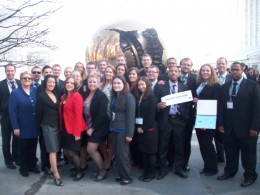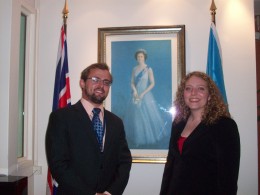
Wright State represented the United Kingdom. The team studied the U.K.’s foreign policy thoroughly before the trip and used that information to give speeches, write resolutions and write position papers during the conference.
For the 33rd year in a row, Wright State University’s Model United Nations team achieved the highest recognition possible at the national conference in New York City.
Competing against 255 teams from universities around the world, Wright State was one of 17 schools to be recognized as having an Outstanding Delegation. The Wright State team also collected several awards for Outstanding Committee Delegates (as voted by their peers) and Outstanding Committee Position Papers.
“The 25 delegates demonstrated award-winning negotiation, consensus building and leadership; they are truly better prepared to be global citizens,” said Donna Schlagheck, Ph.D., political science chair and Wright State’s Model UN faculty advisor.
This year, Wright State represented the United Kingdom. The team studied the U.K.’s foreign policy thoroughly before the trip and used that information to give speeches, write resolutions and write position papers during the conference. The team also visited the U.K. Mission to the United Nations.
Wright State’s head delegates for the 2012 team, Jacquelyn Schroeder and Matthew Conaway, led the preparation on campus as well as Wright State’s team at the conference.
“We got the Outstanding Delegation award again, which means we worked well in committee, we knew our country’s policy, and above all else we were active and effective contributors,” said Schroeder.
Students represent their designated country and produce resolutions by working with students from other teams in committee. They try to get consensus, but different state policies conflict.
“We had to represent the U.K. policy as best we could and interact with others with it in mind at all times,” said Schroeder. “It’s really a game of negotiation and compromise.”
Students say the experience is invaluable because they learn to think from another country’s perspective. The process of learning that country’s position on global issues teaches tools that serve students well beyond the classroom.
“The program engages students in intense preparation for the conference, focusing on public speaking, negotiation, research and writing legislation and treaties,” said Schlagheck.
Schroeder, who has participated in five Model UN conferences, says her experience as head delegate in this, her final year, is bittersweet.
“It’s been my life the last five years, I guess you could say,” Schroeder said. “I’m really proud of the team and the work that they’ve done, definitely. I’m so pleased with all of our results.”


 Bottom Line, Wright State partnership aims to increase access to college
Bottom Line, Wright State partnership aims to increase access to college  Wright State’s nursing program celebrates 50th anniversary
Wright State’s nursing program celebrates 50th anniversary  Wright State celebrates Student Success Champions
Wright State celebrates Student Success Champions  Wright State gold team captures 2024 Horizon League team title, Flynn individual champion
Wright State gold team captures 2024 Horizon League team title, Flynn individual champion  118 medical students to graduate from Wright State’s Boonshoft School of Medicine April 28
118 medical students to graduate from Wright State’s Boonshoft School of Medicine April 28 